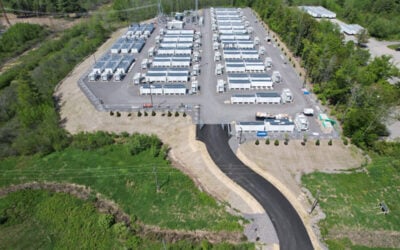Source: Younicos.
The German energy storage market will be worth US$1.03 billion by 2021, representing an 11-fold jump on its 2015 market value in megawatt terms, according to a new report by US analyst GTM Research.
Germany was home to 67MWs (128MWh) of energy storage at the end of 2015, with a value of US$169 million. GTM Research said declining feed-in tariffs, high retail electricity rates and a large installed base of renewables will underpin its escalating growth during the next five years. The country will deliver 161MW (274MWh) by the year-end, it said.
In particular, Germany’s residential market will continue to grow at pace, said GTM Research. The Federal Ministry of Economic Affairs (BMWi) has put aside a budget of €30 million (US$33.24 million) as part of its KfW 275 programme to subsidise installation of energy storage devices in German households through to the end of 2018.
The incentive, administered through the national development bank KfW, ran from 2013 to 2015 offering discounts of 30% on energy storage systems paired with a new or existing solar installations. It was relaunched in March, offering a reduced rebate of 22% on new system costs, reflecting the falling costs of storage technologies. Savings will be cut by 3% every six months going forward.
Try Premium for just $1
- Full premium access for the first month at only $1
- Converts to an annual rate after 30 days unless cancelled
- Cancel anytime during the trial period
Premium Benefits
- Expert industry analysis and interviews
- Digital access to PV Tech Power journal
- Exclusive event discounts
Or get the full Premium subscription right away
Or continue reading this article for free
Commentators suggested in February, as the BMWi announced the scheme’s renewal, the new rules could lead to a small increase in the average level of installed PV generation capacity per household. BVES, a trade association for Germany’s energy storage industry, said at the end of last year subsidies would not be required once “fair market conditions” are established for energy storage.
GTM Research said continued subsidies for German households will see the residential segment continue to lead the local energy storage market. It predicts it will comprise 49% of energy storage in megawatt terms in the country in 2021.
“Germany already possesses one of the world’s largest residential energy storage markets,” said Brett Simon, GTM Research energy storage analyst. “A number of factors, including declining feed-in tariffs, high electricity prices, and the KfW 275 programme, are fuelling substantial interest in residential energy storage for self-consumption.”
GTM Research also said the value of the German utilities sector, the country’s second-largest storage segment, will increase significantly in the next 18 months as six systems in the primary reserve market come on-line in 2016 and 2017, worth 90MW (140MWh).
“Utility-scale systems have been deployed for primary reserve for the past few years, though significant deployments did not begin until 2016. However, the market will saturate by the end of 2017, and thus utility-scale systems will need to pursue other value streams,” said Simon.
The country’s secondary reserve market, serving non-residential customers, will pick up steam from 2018, said GTM Research, with distribution deferral increasingly attractive.
Germany’s main utilities are still playing catch-up in their efforts to make renewables a more central part of their strategies, reckon industry commentators. Their reluctance to press ahead with renewables and disrupt their existing business models is one of the biggest barriers to the Energiewende, Germany’s national energy transition away from nuclear and fossil fuels to a solar and wind base load.
Non-residential storage, the country’s smallest market segment with just 2.7MW deployed in 2015, continues to lack a “clear economic case”, said GTM Research. However, it suggested declining system prices and the emergence of new business models, including virtual power plants, should see it also contribute to the country’s continued growth overall.





